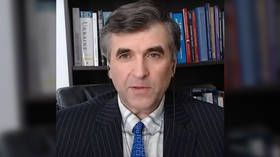Rouble woes mount as Central Bank defence falters
As world's central banks reduce their refinancing rates, Russia has raised it by 1 percentage point to 12%. Analysts say the government is paying the price for bolstering the Rouble.
Russia faces a dilemma – how to defend the Rouble, without causing catastrophic losses in the nation's precious reserves. It raised its key rate on Tuesday, for the fifth time this year. Chris Weafer, Chief Strategist at Uralsib, says the move reflects differing priorities.
“The Russian governments priority – its key priority above all else – is to maintain, try to maintain stability in the currency, try and maintain confidence in the banking system, and try and stem the outflow of capital that has been increasing in the last couple of months. Whereas the priority of governments in the U.S. and Europe is to try and stimulate growth.”
On Tuesday, Russia’s government said it would let the Rouble weaken slightly, by 30 kopeks against the dual currency basket – a one percent devaluation. In order to defend that level, the bank spent around $7 Billion in one day. Despite its attempts to prop up the Rouble, the Central Bank's actions didn't work, according to Ronald Smith, Head of Research at Alfa Bank.
“By devaluing it only 1%, or allowing the basket to slip by 1%, its probably the worst of both worlds. It undermined the confidence in the Rouble and the confidence in the banks determination to defend it. That caused an increased capital flight, they had to spend more money to defend it, and in the end its very difficult to see what they gained from it. If anything it just brought forward the day when they will run low enough on reserves, when they will have to give up on maintaining the currency basket.”
By next month the state's reserves could be up to $100 Billion lighter. Some analysts think the government would be better off stepping away from the exchange rate and allowing the Rouble to find its own equilibrium value. With the oil price spiralling rapidly downwards, the Russian Central Bank is likely to face a tough battle to keep the economy on course.












